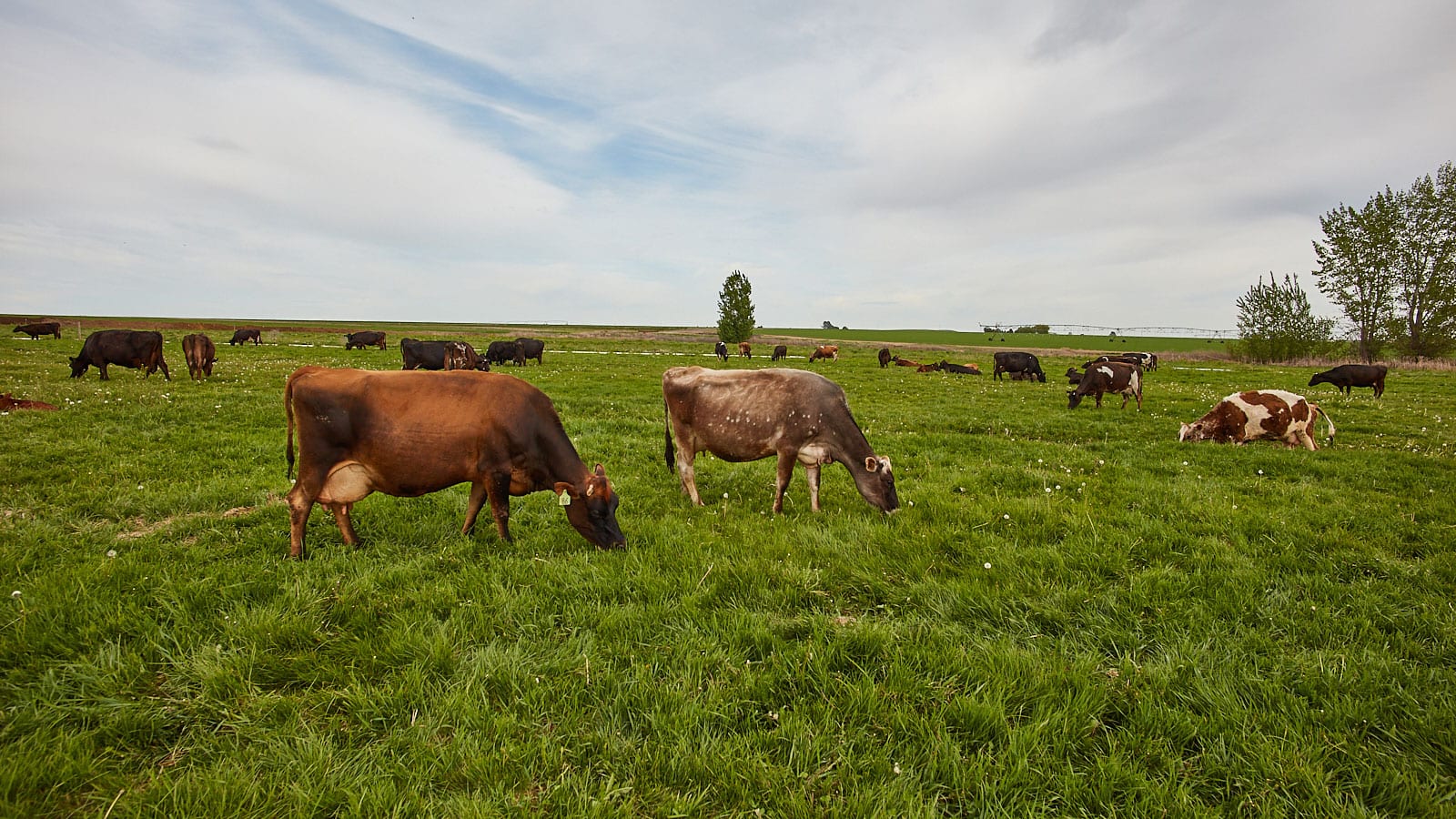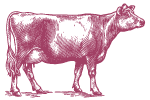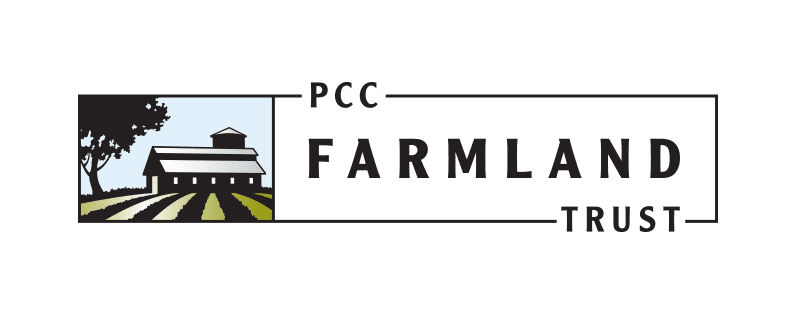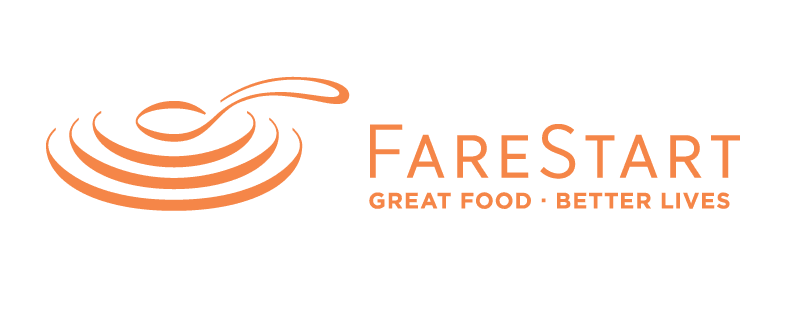
“I hope you find in this report many examples and stories that reinforce that PCC continues to live its values.”
– Cate Hardy, CEO
Read letters from board and ceo

“I hope you find in this report many examples and stories that reinforce that PCC continues to live its values.”
– Cate Hardy, CEO
Read letters from board and ceo
It’s peaceful in the pasture at Pure Éire Dairy in Othello, Wash.; the primary sound is that of grass being ripped from the ground while a bull bellows forlornly a hundred yards away. When cows eat grass, they wrap their tongues around the blades and pull up, tearing rather than biting. As the cows munch, a pair of week-old calves frolic with each other, while other newborns nap in the sunshine, none of them straying too far from mom. Within a matter of minutes, it’s clear these animals are in their natural habitat.
If there’s a golden rule that Jill and Richard Smith of Pure Éire have chosen to do business by, it’s to let nature run its course. When they founded their dairy in 2009, they knew without a doubt they’d operate an organic farm and that their herd would graze.
“We truly believe in the idea of cows being on grass,” said Jill. “That’s what nature intended. If you’re going to be a true organic farmer, you have to have that land base and it has to be set up so the cows can come on and off pasture.”
Situated in the Columbia Basin Irrigation District, Pure Éire has ample access to water, which undoubtedly affects the quality of its grass. A long growing season and rich soil also play a part in the Smiths’ ability to grow lush pasture.
Richard has curated their grass mix carefully, providing a salad bar of sorts for the cows that includes Italian ryegrass and clover. From December to early March, when winter temperatures prevent the herd from staying on pasture, they eat the same mix, but a version that has been chopped and pickled. The fact that they feed grass even in the colder months is a testament to the Smiths’ diligence and dedication.
“In the wintertime it’s colder, so their maintenance takes more,” said Richard. “They eat about the same but instead of giving more milk, they worry about their body condition, they worry about looking after their baby. Everybody else would feed them more grain to compensate but we don’t have that tool in our toolbox, so we accept less production.”
“Our mission with seven cows has been the same mission for 200 cows and that’s our goal going forward, too.”
When it came time to build their herd, the Smiths had the luxury of cherry-picking their cows, so they went for the cream of the crop. With a smaller body frame, Jerseys are well suited for grazing, producing nutrient-dense milk filled with conjugated linoleic acids and omega-3 fats. They also are one of only two heritage breeds with A2A2 DNA, protein that is believed to be more digestible. In regions where A2 cattle are dominant, studies have found a lower rate of heart disease, diabetes and other common disorders among humans.
“Wanting the best quality milk, we felt that A2 would really be an important thing to incorporate into our herd,” said Jill.
They had hundreds of samples tested for it, as only 20 to 25 percent of the breed still carries A2, and eventually selected seven Jersey cows. Since then, they’ve grown their herd internally, one healthy calf at a time.
“We’re just following nature’s orders and that’s all we’re doing.”
While the majority of dairy farms use artificial insemination, the Smiths allow for reproduction the old-fashioned way. They generally keep seven to eight bulls on pasture, averaging one bull per 20 cows. They don’t make the same demands on their cows either.
“We’re not so number driven that we’re tracking every number and going, ‘gosh, she didn’t get pregnant in 30 days so she’s gone,'” said Jill. “We keep her out on grass and wait for her body to be ready.”
In Washington state, the average lifespan of a dairy cow is two lactations, or three to four years.
“We have cows pushing 17 to 18 years old,” said Richard, “but with this low-stress environment, they’re still getting pregnant. So, we leave them alone.”
Another common practice at dairies is to push milk production up to the day a cow gives birth by feeding grain. At Pure Éire, pregnant cows enter a nonlactating dry period at least 60 to 75 days before delivering, so they can prepare for their little one.
“They look after first and foremost their baby, themselves and then we get what’s left,” said Richard.
Keeping with their unconventional approach, Jill and Richard allow their calves to stay by their mother’s side after birth and nurse whenever they please, rather than being relegated to a hutch, isolated from their mother and the herd. This decision inevitably means less milk for the Smiths to use for yogurt, but it also guarantees healthy calves that will be in their herd long term.
“That’s the thing,” said Jill, “we’re not reinventing the wheel.”
“No,” said Richard. “We’re just following nature’s orders and that’s all we’re doing.”
This nature-knows-best belief has led Pure Éire to be the only dairy in the nation that’s both Certified Grassfed and Certified Animal Welfare Approved by A Greener World. Additionally, they’re Non-GMO Project Verified and USDA Certified Organic.
“There’s lots of challenges and there’s lots of other things we could be doing instead of doing it the way we are,” said Jill. “But we hope people see the beauty in what we’re trying to accomplish. Our mission with seven cows has been the same mission for 200 cows and that’s our goal going forward, too. It sets us apart in the marketplace. It gives consumers an option and we feel good about what we’re putting out there. Hopefully it’s a win-win for everybody.”

With Washington growing at a rapid pace, PCC Farmland Trust is leading a call to action to protect the heart of the Puget Sound region: sustainable and organic farmland. As a nonprofit and 501(c)(3), PCC Farmland Trust’s mission is to secure, preserve and steward threatened farmland in Washington, ensuring that generations of local farmers productively farm using sustainable and organic growing methods. They take their mission one step further by innovating on traditional conservation tools to provide access to affordable farmland.
We donated over $240,000 to support the PCC Farmland Trust in 2017. Shoppers and vendors funded over $78,000 of that donation — the rest was in-kind or financial support from PCC. We are proud to be working with the PCC Farmland Trust to protect farmland in Washington state.

With a mission to provide real solutions to poverty, homelessness and hunger, FareStart has been transforming lives through food in Seattle for more than 25 years.
In 2017, we gave approximately $25,000 in in-kind and financial support to FareStart. In addition to sponsoring the FareStart Gala, we provided a class for at-risk youth in our community where they cooked alongside a PCC Cooks instructor to learn how the food industry works.
Our expert chefs also participated in two FareStart Guest Chef Night dinners, working with program participants to serve a restaurant-quality, three-course meal to diners.
Finally, when individuals graduate from FareStart’s job training program, our HR team helps them update their resumes and practice interviewing skills. In some cases, PCC hires graduates. For these individuals, the HR team works to ensure a smooth transition, providing additional mentoring and moral support.
In 2017, the PCC Community Grant program awarded $2,000 to four local nonprofits associated with food systems and social responsibility.
Alleycat Acres Seattle
Reconnects people, place and produce through an urban farming collective.
International Community Health Services
Provides medical and dental care to Seattle and King County Asian and Pacific Islander communities.
Hunger Intervention Program
Increases food security for underserved populations in North King County through nutritious meals, educational programs, and advocacy.
Camp Fire Central Puget Sound
Inspires and enables youth of all backgrounds and abilities to discover their spark, value the natural world, and become tomorrow’s leaders, today.
In collaboration with Organically Grown Co., we donated $68,000 in proceeds from the sale of organic apples in 2017 through our Farm to School bagged apples. These funds were donated to farm-to-school programs at Oxbow Farm & Conservation Center, Green Plate Special and Tilth Alliance.
We donated $26,000 from banana proceeds in 2017 to support banana farm worker health and well-being through the GROW (Giving Resources and Opportunities to Workers) Fund.
PCC partners with Chinook Winery to offer specially labeled bottles of wine to support salmon habitat. For every bottle sold, we donate $2 to Long Live the Kings on behalf of PCC shoppers, which amounted to $5,254 in 2017.